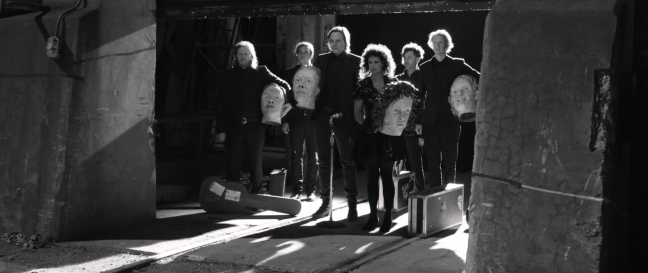Arcade Fire’s latest album, Reflektor, their highly ambitious follow-up to 2010’s The Suburbs, takes the band in a new direction with production influence from James Murphy and the addition of two Haitian percussionists, Willinson Duprate and Verrieux Zile, who are confirmed to tour with the band in support of the album.
While the band experiments with new sound, the themes featured are typical of Arcade Fire, as are the anthemic choruses and grandiose style. The album is a patchwork of many different musical styles and, at times, can be a difficult listen.
The first disc of the double album shows a welcome return to the band’s characteristic anthemic choruses. While The Suburbs featured a departure from these distinct choruses, Reflektor happily welcomes them back. “Joan of Arc” opens with a punkish, aggressive intro, after which the band settles back into the regular, laid-back tempo of the majority of side A. In a call-and-response vocal pattern like those found in nearly every song on the album, singer Régine Chassagne sings “Jeanne D’Arc” in responses to the band’s shouts of “Joan of Arc.”
“Here Comes the Night Time” is a standout track. The song, while upbeat, is lyrically dark. The song is inspired by Haitian culture: in an interview with Rolling Stone, frontman Win Butler describes the song as influenced by the moment “when the sun is just starting to go down in Port au Prince, and it’s really intense because most of the city doesn’t have electricity so everyone is just racing to get home before dark.” The band has close ties with Haiti, as Chassagne’s parents emigrated from Haiti to Montreal.
“Here Comes the Night Time” recalls the criticisms of religion that are prevalent on 2007’s Neon Bible with the rather horrifying lyric, “Now the preachers they talk up on the satellite / If you’re looking for Hell, just try looking inside.” Even with heavy themes the song remains upbeat, with constantly driving percussion, rapid tempo changes and what Butler described to Rolling Stone as a “Haitian rara beat.” The piano melody is a guaranteed earworm, and the song’s energy is contagious — the foot-tapping, head-nodding beat pulses constantly behind the shifting vocals and guitar, giving the song a danceable energy.
After a 10-minute interlude, the album transitions to the second disc. “Awful Sound (Oh Eurydice)” and “It’s Never Over (Oh Orpheus)” are difficult listens which together make up a full 12 minutes of the album. These songs are an artistic reflection on the myth and are musically complex but lyrically dull. The reverberating chords of “Awful Sound (Oh Eurydice)” give the second half of the album fullness and depth. “It’s Never Over (Oh Orpheus)” has catchy melodies, although Butler’s voice is almost overly distorted as he sings, “Wait until it’s over / Wait until it’s through.”
Reflektor is an intense listening experience, with a variety of sounds, styles and tempos: disc one features strong and occasionally aggressive vocals, while disc two is echo-y and lush, with extended songs that blend into one another. The album is complex, and the 60-minute-plus listen can be difficult to appreciate the first time around, with songs like “Flashbulb Eyes” packed up against regular anthemic choruses and six-minute-plus songs. Arcade Fire has thrown a little bit of everything into this album, and time will tell if it is successful or not. The album begs the listener’s attention: It cannot just be background music, it demands to be heard and appreciated on its own merit. The album reflects Arcade Fire’s own approach to Reflektor: their aggressive marketing shows stubbornness — they will do the unconventional, and they will receive praise for it, the album seems to say.
3.5 out of 5 stars



























